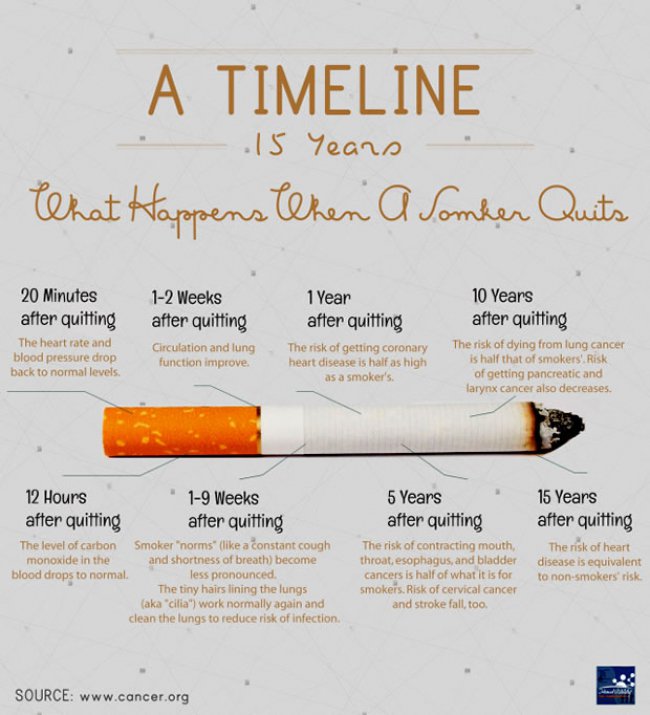What Happens to The Body When You Stop Smoking
What Happens to The Body When You Stop Smoking
There is no doubt that smoking is one of the most, if not THE most, detrimental thing we can do to our bodies by choice. It causes much more detriment than just lung cancer; in fact it is implicated in most cancers of the body. It can cause ectopic pregnancies and erectile dysfunction, a host of issues with the heart and circulatory system, as well as an overall generalized diminishment of health.
Quitting smoking is the best thing a person can do for their body. Positive changes begin to happen immediately. Your hair, clothes and skin will smell better; no more being the odoriferous one! Moreover, your body rapidly starts healing from within.

Timeline of Changes After Quitting Smoking:
1. Heart Rate / Blood Pressure Drop
Within 20 minutes of taking that last puff, your heart and circulatory system begins to work more efficiently.
2. Carbon Monoxide Level Normalizes
According to the US Surgeon General’s Report in 1988, within 12 hours of quitting the level of carbon monoxide in the blood returns to normal.
3. Lung Function / Circulation
As soon as two weeks after quitting, lung function improves and circulation increases. This continues to grow over time, but some people may not see these effects until as many as three months.
4. Breathing / Lung Cilia
From 1—9 months after quitting, breathing continues to get better. Shortness of breath decreases as the cilia in the lungs regrow and begin to function properly. With this, coughing is not as prevalent, and the body has a better chance of fighting off colds and infection.
RELATED ARTICLE: See What Smoking Does to Your Face!
5. Cancer / Stroke Risk
Within 2—5 years, the likelihood of stroke can become that of a non-smoker. After five years, certain cancers such as a bladder, esophagus, and those of the throat and mouth are cut in half. Cervical cancer odds fall to that of non-smokers.
6. Lung Cancer
After 10 years without lighting up, the chance of being diagnosed with lung cancer is half of those still smoking. Larynx and pancreas cancer risks are decreased.
7. Coronary Disease
According to the IARC publication, Tobacco Control: Reversal of Risk After Quitting Smoking, after 15 years the chance of coronary heart disease is back to that of a non-smoker. Your heart is happy again!
More Benefits of Quitting
The above timeline details only some of the positive effects. Diabetes risk lowers, and diabetics may find it is easier to control blood sugar levels. Other than smelling better, skin and hair look better and nails lose the yellow stain. Wrinkles around the mouth may fade a bit and their growth slows, and teeth begin to get whiter within weeks. Your breath will smell much better as well! Another bonus is that your sense of smell returns to normal, and food tastes much better without all of the added salt and seasonings.
You Can Quit, Too
It is best never to start smoking in the first place. If you do pick up the habit then the younger you quit, the better. However, it is never too late to quit smoking, and there are plenty of resources available to help.
RELATED ARTICLE: Kick Nicotine Out Of Your Lungs With These 3 Flusher Foods
Smokefree.gov is an excellent resource for those looking to put down the pack for good. They provide detailed information on how smoking affects the body and how quitting now can improve health. There are also stop smoking plans and recommendations, advice on how to manage withdrawal symptoms and mood changes, and much more.
Medications are widely available that can help as well. If you do not want to try pharmaceuticals, look into the many natural remedies that have helped others. One of the best is Black Pepper Essential Oil. When a craving hits, simply open the bottle and take a whiff – you will be amazed how well it calms the urge.
แหล่งที่มา WWW.SMOKEFREE.GOV WWW.CANCER.ORG

